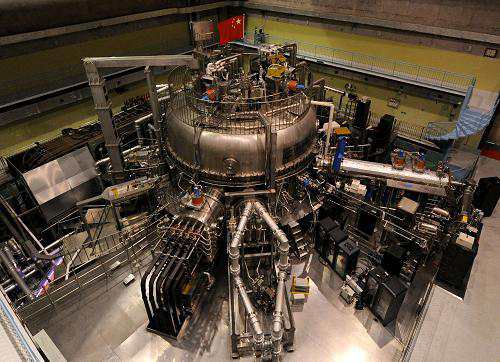


[File photo]
Chinese scientists have successfully obtained high-confinement plasma for a record length of time, which experts believe will promote the development of international thermonuclear fusion research.
The recent experiment was conducted using China’s Experimental Advanced Superconducting Tokamak (EAST), an experimental thermonuclear fusion reactor that replicates the energy-generating process of the sun. The experiment demonstrated the sustainability of plasma in the H-mode confinement regime, lasting over one minute. This achievement will be key to the success of the International Thermonuclear Experimental Reactor (ITER), the largest international program dedicated to thermonuclear fusion experiments. It also marks a major step forward for fusion studies, Thepaper.cn reported on Nov. 2.
This is not the first time that EAST has generated enduring plasma. In 2012, plasma in a similar environment was maintained for 32 seconds, breaking the world record at that time. Since then, EAST has had its tungsten diverters and auxiliary heating system upgraded, laying the foundation to create long-pulse, high-confinement plasma.
Officially established in 2006, the EAST fusion reactor is run by the Institute of Plasma Physics in Hefei, which aims for plasma pulses lasting up to 1,000 seconds.
 Fire brigade in Shanghai holds group wedding
Fire brigade in Shanghai holds group wedding Tourists enjoy ice sculptures in Datan Town, north China
Tourists enjoy ice sculptures in Datan Town, north China Sunset scenery of Dayan Pagoda in Xi'an
Sunset scenery of Dayan Pagoda in Xi'an Tourists have fun at scenic spot in Nanlong Town, NW China
Tourists have fun at scenic spot in Nanlong Town, NW China Harbin attracts tourists by making best use of ice in winter
Harbin attracts tourists by making best use of ice in winter In pics: FIS Alpine Ski Women's World Cup Slalom
In pics: FIS Alpine Ski Women's World Cup Slalom Black-necked cranes rest at reservoir in Lhunzhub County, Lhasa
Black-necked cranes rest at reservoir in Lhunzhub County, Lhasa China's FAST telescope will be available to foreign scientists in April
China's FAST telescope will be available to foreign scientists in April "She power" plays indispensable role in poverty alleviation
"She power" plays indispensable role in poverty alleviation Top 10 world news events of People's Daily in 2020
Top 10 world news events of People's Daily in 2020 Top 10 China news events of People's Daily in 2020
Top 10 China news events of People's Daily in 2020 Top 10 media buzzwords of 2020
Top 10 media buzzwords of 2020 Year-ender:10 major tourism stories of 2020
Year-ender:10 major tourism stories of 2020 No interference in Venezuelan issues
No interference in Venezuelan issues
 Biz prepares for trade spat
Biz prepares for trade spat
 Broadcasting Continent
Broadcasting Continent Australia wins Chinese CEOs as US loses
Australia wins Chinese CEOs as US loses